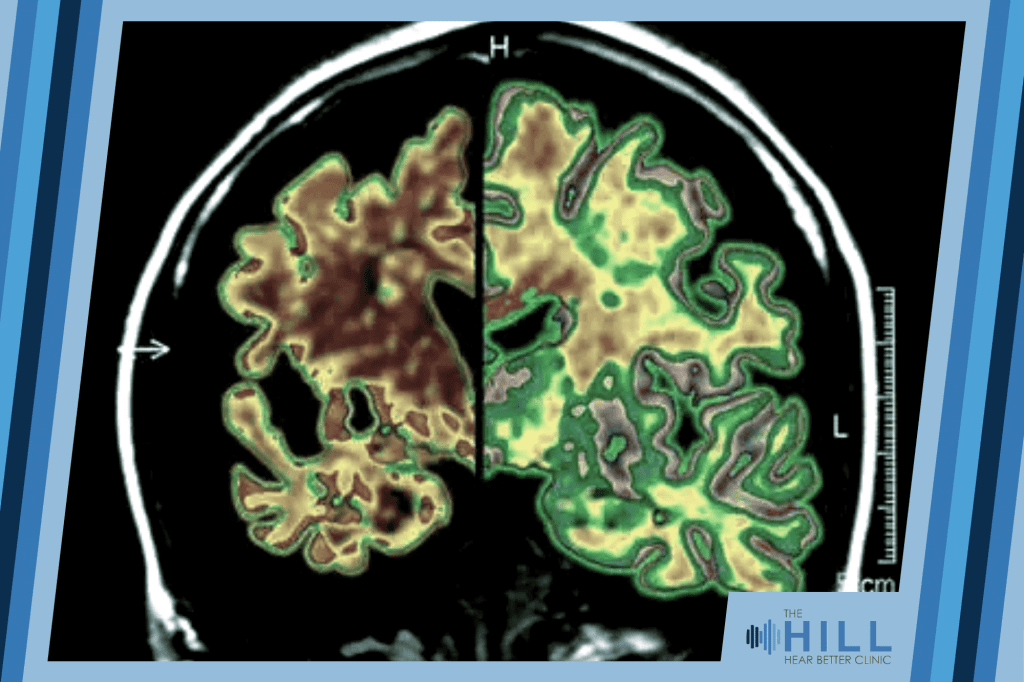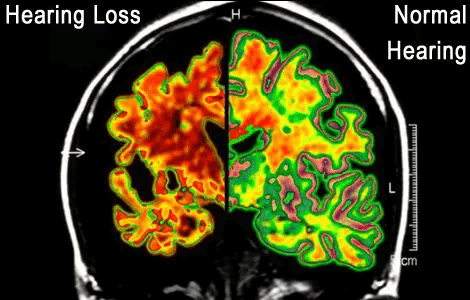
Click here or call 513-494-8801 to schedule your evaluation!
From medication to surgery to behavioral health, our knowledge of the human brain and how to treat it is deeper than ever. But there?s still much to learn about the incredible and incredibly complex organ that?s (presumably) sitting inside each of our heads. As audiologists, we?re paying close attention to findings that better define the relationship between your brain and your sense of hearing. And some of these findings have us particularly concerned: it?s now understood that hearing loss changes your brain.
Though there?s still much research to be done on the link between hearing and cognition, we?ll explain why untreated hearing loss could be dangerous for your gray matter – and what you can do about it.
Your Ears and Your Brain – What?s the Connection?
You?ve probably heard this tired old phrase before: ?If you don?t use it, you?ll lose it.? For example, if you don?t exercise your different muscle groups regularly, they can weaken and you?ll be less ?fit?. But it doesn?t apply everywhere: there?s a reason ?like riding a bike? is another cliche, meaning a skill you can easily pick back up after a long hiatus.
It may seem strange to ?practice? hearing, but that?s exactly what your ears do all day, every day. Sound that enters your ears stimulates the auditory processing centers of your brain, even while you?re sleeping. Even when you don?t realize it, you are constantly exercising your hearing ability.
But what does that ability look like, exactly? Hearing isn?t just something that happens when sound enters your ears. In fact, only about 40 percent of your ability to hear comes from your ears themselves. The other 60 percent takes place within the brain itself. Your brain has three important ways to process sound:?
- Auditory discrimination is the ability to tell the difference between similar sounds. You can understand whether someone is talking about a resident or a president or a dog or a hog.
- Auditory attention is the ability to focus on sounds, which enables you to follow a conversation when you?re in a noisy environment like a restaurant.
- Auditory memory is how your brain ?records? the sounds you hear. It gives you the ability to recall the melody of a song, a simple everyday noise, or the words someone spoke to you.
How Hearing Loss Changes Your Brain
When you stop exercising your muscles, they begin to lose the strength they had built up. The same goes for your hearing: if you don?t use it, you?ll lose it! The longer your brain is deprived of auditory stimulation, the more of your hearing ability is lost. If you took a hearing test before experiencing hearing loss and scored 100 on a word recognition test, you may only score 60 after living with untreated hearing loss for several years.
This is because untreated hearing loss causes your brain to change over time. In the image below, you can see the difference in brain activity between someone with normal hearing on the right and someone living with untreated hearing loss on the left:
 As you can see, hearing loss changes your brain. Notice how there isn?t just less activity going on in the left image. Some of the activity is happening in different areas. Your brain doesn?t just stop all of its activity related to hearing when you experience a hearing loss. When auditory signals stop coming in, the brain has a harder time making sense of what?s going on around you? and a lot of unused energy that would normally have gone to the auditory cortex.
As you can see, hearing loss changes your brain. Notice how there isn?t just less activity going on in the left image. Some of the activity is happening in different areas. Your brain doesn?t just stop all of its activity related to hearing when you experience a hearing loss. When auditory signals stop coming in, the brain has a harder time making sense of what?s going on around you? and a lot of unused energy that would normally have gone to the auditory cortex.
To try to compensate, your brain actually begins rewiring itself to make the most of what it has. It allocates more energy toward stimuli that can help pick up the slack – like lipreading, for example. But if you seek treatment for hearing loss using hearing aids or some other device or procedure, the process doesn?t necessarily work in reverse. You may not get back the hearing ability in your brain that you?ve lost.
What are the consequences?
Hearing loss is more than just an inconvenience and it?s about more than just your ears. The relationship between your hearing and your brain is complex, but vitally important to your overall health – especially as you age.
We?ve seen that hearing loss changes your brain, but what exactly does that mean for you? To start with, hearing loss can give you difficulty with everyday auditory mental functions. Things like remembering what people say, deciphering and recognizing sounds, and listening to music or the TV can become more difficult. And because it can be harder to understand speech and participate in conversations, you may begin to have feelings of isolation and depression.
It doesn?t stop there, though. Less hearing means less activity in the brain, which can contribute to cognitive decline and dementia. In fact, according to the 2020 report of the Lancet Commission, hearing loss was the largest of 12 modifiable risk factors for dementia. Early treatment of hearing loss can slow or even stop cognitive decline as you age. It can also reduce the risk or delay the onset of dementia.
Early, effective treatment of hearing loss isn’t just a convenience. It’s an important treatment to consider as you age. Hearing aids and other treatments can significantly improve your quality of life. At The Hill Hear Better Clinic, we?re equipped to find the treatment that’s right for your unique experience of hearing loss. Our expert audiologists can evaluate your exact level of hearing loss, test for cognitive decline, and find solutions that are suited to your needs.
Learn more about the benefits of a professional hearing evaluation here!
Don’t wait until it gets worse. Contact us today to book your hearing evaluation at The Hill Hear Better Clinic!
